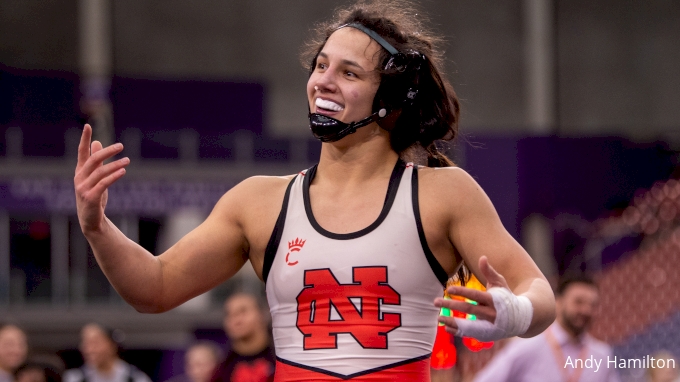Instructions

In a groundbreaking move for collegiate athletics, the NCAA has officially expanded its championship sports lineup by adding women's wrestling as its 91st competitive sport. This historic decision marks a significant milestone for female wrestlers across the United States, opening up new opportunities for collegiate athletic competition and recognition.
The vote by NCAA Division I, II, and III representatives signals a powerful commitment to gender equity in collegiate sports, providing women wrestlers with a prestigious national platform to showcase their skills, dedication, and athletic prowess. This addition not only validates the growing popularity of women's wrestling but also creates pathways for talented athletes to compete at the highest collegiate levels.
Women's wrestling has been steadily gaining momentum in recent years, with increasing participation rates in high schools and club programs nationwide. The NCAA's decision reflects the sport's rising profile and the incredible talent of female wrestlers who have long sought formal recognition in collegiate athletics.
This landmark decision is expected to inspire more young women to pursue wrestling as a competitive sport and provide them with enhanced opportunities for athletic scholarships and national exposure. The wrestling community has celebrated this announcement as a transformative moment for gender inclusivity in collegiate sports.
Breaking Barriers: Women's Wrestling Secures Historic NCAA Championship Status
In a groundbreaking moment for collegiate athletics, the landscape of competitive sports is undergoing a transformative shift that promises to redefine opportunities for female athletes across the United States. The recent decision by the NCAA represents more than just an administrative change—it's a powerful statement about inclusivity, recognition, and the evolving dynamics of competitive wrestling.
Shattering Stereotypes: A Milestone for Women's Athletic Empowerment
The Historical Context of Women's Wrestling
Women's wrestling has long existed in the shadows of male-dominated athletic programs, struggling to gain legitimate recognition and institutional support. For decades, female wrestlers have fought against systemic barriers, limited funding, and cultural stereotypes that marginalized their athletic prowess. The NCAA's decision marks a pivotal moment in this ongoing narrative of resistance and empowerment.
The journey to this landmark moment has been characterized by persistent advocacy from athletes, coaches, and supporters who have tirelessly championed the cause of women's wrestling. These dedicated individuals have consistently challenged preconceived notions about gender and athletic capability, demonstrating that wrestling is not just a male-dominated sport but a discipline that demands skill, strategy, and extraordinary physical and mental strength.
Institutional Recognition and Structural Transformation
By elevating women's wrestling to a championship sport, the NCAA is fundamentally restructuring the competitive landscape. This decision goes beyond symbolic representation—it promises tangible benefits including dedicated funding, structured competitive pathways, and enhanced recruitment opportunities for female wrestlers across collegiate institutions.
The implications of this change extend far beyond the wrestling mat. It signals a broader commitment to gender equity in collegiate sports, challenging long-standing disparities in athletic opportunities and resources. Universities will now be compelled to invest in women's wrestling programs, develop robust training infrastructures, and create competitive ecosystems that nurture emerging talent.
Athletic and Social Implications
The inclusion of women's wrestling as the 91st NCAA championship sport represents a critical milestone in athletic representation. It validates the extraordinary skills of female wrestlers and provides a structured platform for their competitive aspirations. Young athletes will now see clear, institutionally supported pathways to pursue wrestling at the highest collegiate levels.
Moreover, this decision has profound societal implications. By recognizing women's wrestling, the NCAA challenges deeply ingrained gender stereotypes and promotes a more inclusive understanding of athletic excellence. It sends a powerful message that athletic capability is not determined by gender but by dedication, skill, and passion.
Future Prospects and Developmental Opportunities
The championship status will inevitably accelerate the development of women's wrestling programs nationwide. Colleges and universities will be motivated to recruit top talent, invest in coaching expertise, and create competitive environments that match the intensity and professionalism of male wrestling programs.
Potential scholarship opportunities will expand, providing financial support for talented female wrestlers who might have previously been overlooked. This structural support will create a virtuous cycle of talent development, inspiring future generations of athletes and gradually transforming the sport's cultural landscape.
Broader Cultural Impact
Beyond the immediate athletic context, this decision represents a significant cultural shift. It challenges traditional narratives about women's athletic capabilities and provides a powerful platform for challenging gender-based limitations. Female wrestlers will now have a prominent stage to showcase their extraordinary skills, potentially inspiring millions of young athletes to pursue their dreams without constraint.
The NCAA's decision is not just an administrative update—it's a testament to the power of persistent advocacy, the changing dynamics of collegiate sports, and the ongoing journey towards genuine athletic equity.

